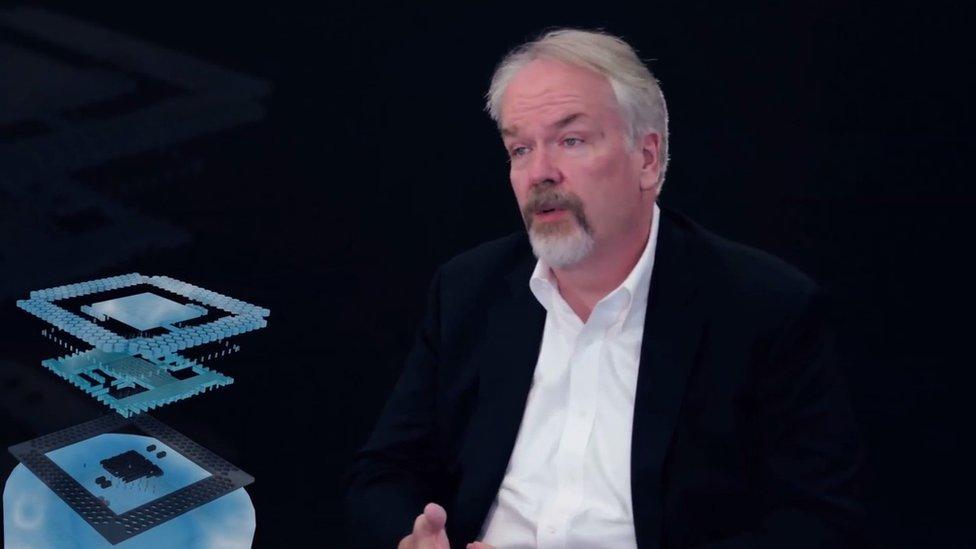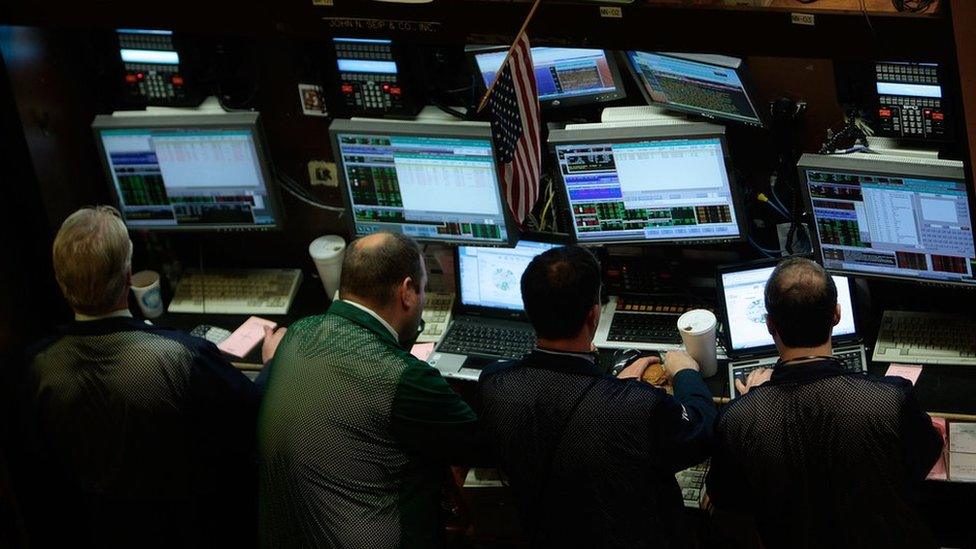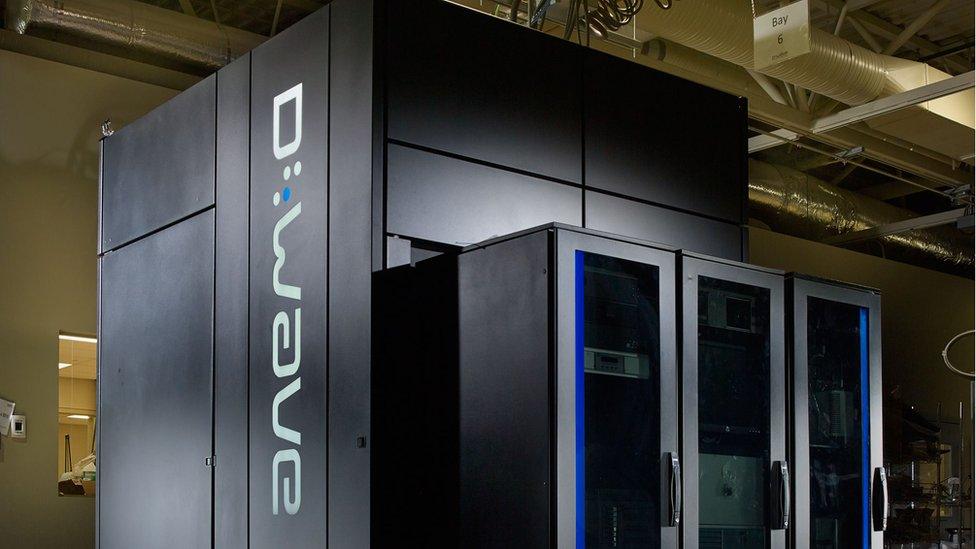Quantum computing: Game changer or security threat?
- Published

In quantum computing, a qubit can be one, zero, or one and zero at the same time
Superfast quantum computers could transform the world of finance, advocates say.
In a world where how fast you can assimilate and analyse data, then act on it, makes the difference between profit and loss, computing speed is key.
This is why banks, insurance firms and hedge funds invest millions on technology to give them an edge when trading and to offset human error.
Quantum computers, that owe more to quantum mechanics than electronics, promise to be exponentially more powerful than traditional computers, holding out the tantalising prospect of near-perfect trading strategies and highly accurate forecasting and risk assessments.
"Financial services is a data-rich environment," says Kevin Hanley, director of design at the Royal Bank of Scotland (RBS). "Time is money and the ability to process data fast could have a huge potential benefit for our customers."

Quantum computing in a nutshell

In Schrodinger's thought experiment the cat in the box is both dead and alive at the same time
Classical computing relies on binary digits or bits - ones and zeros representing on/off, true/false states.
Quantum computing, on the other hand, features qubits, which can be both 0 or 1 at the same time - a state known as superposition. It all goes back to Schrodinger's cat, but that's another story....
Subatomic particles such as electrons, photons or ions can be made to behave in this mysterious way.
And because of this flexibility, qubits can do a lot more - a quantum computer could theoretically carry out trillions of calculations per second.
But these computers aren't easy to build or operate. Quantum processors from one of the leading manufacturers in this field - D-Wave, external - need to be cooled to just above absolute zero (-273.15C). They also need to be free from any electromagnetic interference.
This makes them bulky and costly; D-Wave's computers cost about $10m-15m.
Ironically they're also a bit limited in the kinds of calculations they can currently do, and many observers are still sceptical about how fast they really are.
So it's fair to say we're still at the very early stages of quantum computing.

Goldman Sachs, RBS, Guggenheim Partners and Commonwealth Bank of Australia have all invested in quantum computing, with the aim of stealing a march on their competitors.
"This is interesting to the financial world because if you can find an algorithmic advantage to solve a problem, that can give you a great competitive advantage," says Colin Williams, director of business development for D-Wave.

D-Wave CEO Vern Brownell says two more generations of its quantum processor will be released over the next five years
Google, Nasa, Lockheed Martin, the US Department of Energy and the University of Southern California have all used D-Wave's systems so far.
Other tech companies, such as Cambridge Quantum Computing, external, QxBranch, external and Rigetti, external, are also rushing to develop the hardware and software needed to make quantum computing a reality.
Longer-term visibility
Quantum computers could solve problems in a day that would take classical computers thousands of years to solve.
So in the world of investment, they could consider millions of different global investment scenarios and calculate which ones have the best chance of success over the long-term.
"We can build an optimal portfolio today, but tomorrow it won't be optimal and needs to be rebalanced, which is expensive," says Marcos Lopez de Prado, a senior managing director at Guggenheim Partners.

Humans and computers are constantly monitoring the markets and tweaking portfolios
Quantum computers could, in theory, give investment firms much better visibility over the longer-term to make more accurate predictions and reduce this need to tinker with their portfolios, saving costs and possibly boosting profits.
"If you can predict the US dollar/Swiss franc exchange rate a tenth of a cent more reliably, then the value isn't in the computer, it's in the cost saving," says Mr Williams.
Better forecasting could also reduce the prevalence of high-frequency trading, which has been accused of creating market volatility.
High-frequency traders have also been blamed for raising the costs of trading for ordinary investors by swooping into purchases nanoseconds before an interested party and reselling the stocks at a higher price.
Not so fast
So how soon will quantum computers be readily available?
D-Wave's Mr Williams reckons businesses will have access to quantum computing functionality by 2018, whereas RBS's Mr Hanley thinks it will be "five to 10 years before quantum computing comes of age".
But this isn't stopping financial institutions getting excited.
Blu Putnam, chief economist for the CME group - a US-based derivatives market - says quantum computing has led to a "mind-set change" where financial services "now seek out the nearly impossible to solve problems" in asset and risk management.

D-Wave's quantum computer is big and expensive
Before then, there is a lot of preparation to do.
Quantum computers can't be interrogated in the same way as traditional computers. The algorithms - sets of complex mathematical rules - used for classical computing need to be reworked to fit into the quantum system.
And finding and training computer scientists to understand and use these systems effectively is another big challenge for the financial services industry.
But Mr Hanley says: "Rather than observe these changes from a distance or be last in the queue, I'd rather be at the front and have a seat at the board."
Cracking the code
Quantum computing may offer potential benefits to the financial services industry, but it also poses risks.
Banks rely on encryption to keep their transactions and customer data secure. This involves scrambling and unscrambling data using keys made of very large numbers - tens, if not hundreds, of digits long.
A hacker would have to find the right key by trial and error and test it in order to unlock the data - a process that could take hundreds of years even with the most powerful of today's supercomputers.

Could quantum computers unlock the world's encryption systems?
But quantum computers could crack the code with relative ease, potentially undermining the security of the entire global financial services industry.
Such a possibility leads Mr Lopez de Prado to fear that governments might outlaw quantum computers entirely.
"Governments could say they should be banned because otherwise there would be no secrets, but they can't be un-invented.
"We need a new mathematical breakthrough that creates an unbreakable encryption," he says.
Cryptographers are busy working on new algorithms to block attacks from future quantum computers and many believe this will be possible.
But the industry needs this breakthrough fast. The processing power of quantum computing is growing with each generation.

Follow Technology of Business editor @matthew_wall on Twitter, external.